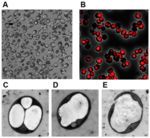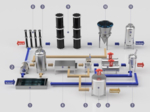-
Press release - 27/05/2021
The pulp of coffee beans is considered a waste product on coffee plantations, which is usually thrown away or dumped into rivers - with significant negative consequences for climate change and the environment. Macarena San Martín-Ruiz from the University of Stuttgart is working with Coopetarrazú, the largest coffee cooperative in Costa Rica, to find out how the mixture of pulp and husks can be turned into organic compost and thus protect the…
https://www.biooekonomie-bw.de/en/articles/pm/coffee-s-pulp-waste-becomes-organic-compost
-
-
Press release - 30/03/2023
Composite materials provide stability in aircraft parts, sports equipment, and everyday household items. However, most of these materials have a poor carbon footprint and are not naturally degradable. A more sustainable alternative has been developed by a team from the University of Stuttgart. This completely bio-based composite material is made of flax fibers and the biopolymer chitosan.
https://www.biooekonomie-bw.de/en/articles/pm/green-composite-material-made-flax-and-chitosan
-
Sustainable binder alternative - 18/12/2023
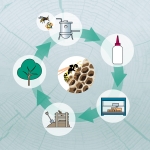
Plastic is all around us; and unfortunately, it is not going away any time soon. The search for more sustainable solutions is fully underway. However, binders that degrade only with difficulty or not at all are still used to bond natural materials such as wood and straw - not yet truly environmentally friendly. Fraunhofer researchers are working on an insect-inspired wood binder that makes bonded wood products both resistant and biodegradable.
https://www.biooekonomie-bw.de/en/articles/news/copied-insects-new-biological-wood-binder-under-development
-
-
Plastics from the field - 12/08/2021
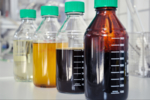
Huge amounts of waste are produced both during food production and by consumers. The Conversion Technologies of Biobased Resources group at the University of Hohenheim’s Institute of Agricultural Engineering has developed a process to convert this biomass into hydroxymethylfurfural (HMF), the highly potent basic chemical that is used to produce plastics.
https://www.biooekonomie-bw.de/en/articles/news/great-potential-biological-residues
-
-
-
Press release - 23/02/2021
The European Commission agreed on the successor of BBI JU – the Circular Bio-based Europe Joint Undertaking (CBE JU) in a legislative proposal adopted today. The new partnership between the EU and the Bio-based Industries Consortium (BIC) is expected to build on the success of BBI JU while stepping up its contribution to the EU’s climate targets, in line with the European Green Deal. The European Parliament and Council will now study the…
https://www.biooekonomie-bw.de/en/articles/pm/commission-gives-green-light-successor-bbi-ju
-
Reduction of greenhouse gases in wine production - 31/08/2021

In the EU project REDWine, the CO2 produced during wine fermentation is captured and used to produce algae biomass. Novis GmbH from Tübingen supplies the complete system for CO2 utilisation. The aim of the project is to reduce the share of global warming caused by wine production in a way that is economical for producers.
https://www.biooekonomie-bw.de/en/articles/news/redwine-project-and-climate-change
-
-
Press release - 07/07/2021
The European Union is largely dependent on imports of white phosphorus (P4), a strategic raw material for the food and pharmaceutical industries. To tackle this challenge, the newly started four-year EU-funded project FlashPhos – led by the University of Stuttgart – will recover at a large scale high-quality white phosphorus and other raw materials using sewage sludge as input material.
https://www.biooekonomie-bw.de/en/articles/pm/schatzsuche-im-klaerschlamm
-
Dossier - 09/11/2020

What will the packaging of the future look like, and what will be required of it? Can packaging be biobased, recyclable, sustainable and economic? In Baden-Württemberg, there are various approaches to developing packaging with the above properties from various sources including agricultural residual and side streams as well as municipal waste.
https://www.biooekonomie-bw.de/en/articles/dossiers/packaging-future
-
Press release - 02/02/2022
fischertechnik has set a new milestone with the Animal Friends construction kit, as the building blocks and packaging are largely made of renewable resources and the models depict playful animals in new colours. The company is thereby taking another major step towards sustainability. The bio-based building set recently won the Toy Award, one of the most prestigious awards in the industry.
https://www.biooekonomie-bw.de/en/articles/pm/animal-friends-aus-nachwachsenden-rohstoffen
-
-
-
-
-
-
Dossier - 19/10/2022
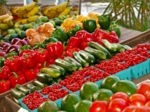
Strawberries in winter and imported apples? You can find them in most supermarkets. This is not sustainable. Looking to the future, the way we eat needs to change in many mundane ways – and this needs to happen quickly so that future generations will also be able to enjoy a planet that is worth living on. In Baden-Württemberg, alternative nutrition concepts are being worked at pace. Many creative ideas and innovative products already exist.
https://www.biooekonomie-bw.de/en/articles/dossiers/more-food-sustainability-crucial-people-and-environment
-
Climate-neutral wastewater treatment plants thanks to patented real-time analytics - 08/11/2023
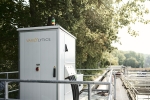
The wastewater industry is responsible for global greenhouse gas emissions equivalent to those of global aviation. The start-up Variolytics has found a way to significantly reduce greenhouse gases in wastewater treatment plants using real-time analytics. The patented sensor technology and AI-supported process optimisation offer multiple benefits: in addition to reducing nitrous oxide, the system helps to reduce energy costs and resources.
https://www.biooekonomie-bw.de/en/articles/news/using-ai-reduce-greenhouse-gases-wastewater-companies
-
Article - 12/03/2019
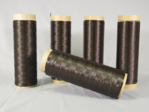
Carbon fibre is increasingly found in airplanes, cars and wind turbines. Carbon fibre is still made from oil and relatively expensive. However, this is soon to change. Researchers from the German Institutes of Textile and Fibre Research in Denkendorf (DITF) are working on the development of cost-effective carbon fibre made of lignin, a by-product of papermaking.
https://www.biooekonomie-bw.de/en/articles/news/biocarbon-fibres-made-of-lignin
-
Press release - 04/01/2021
As healthy and tasty as mushrooms might be, they are good for much more than just the dinner plate. The Fraunhofer Institute for Environmental, Safety and Energy Technology UMSICHT has now teamed up with the Fraunhofer Institute for Building Physics IBP to investigate the use of fungus-based materials for the fabrication of eco-friendly sound absorbers.
https://www.biooekonomie-bw.de/en/articles/pm/Fungus-as-a-sound-absorber
-
-
Website address: https://www.biooekonomie-bw.de/en/search



